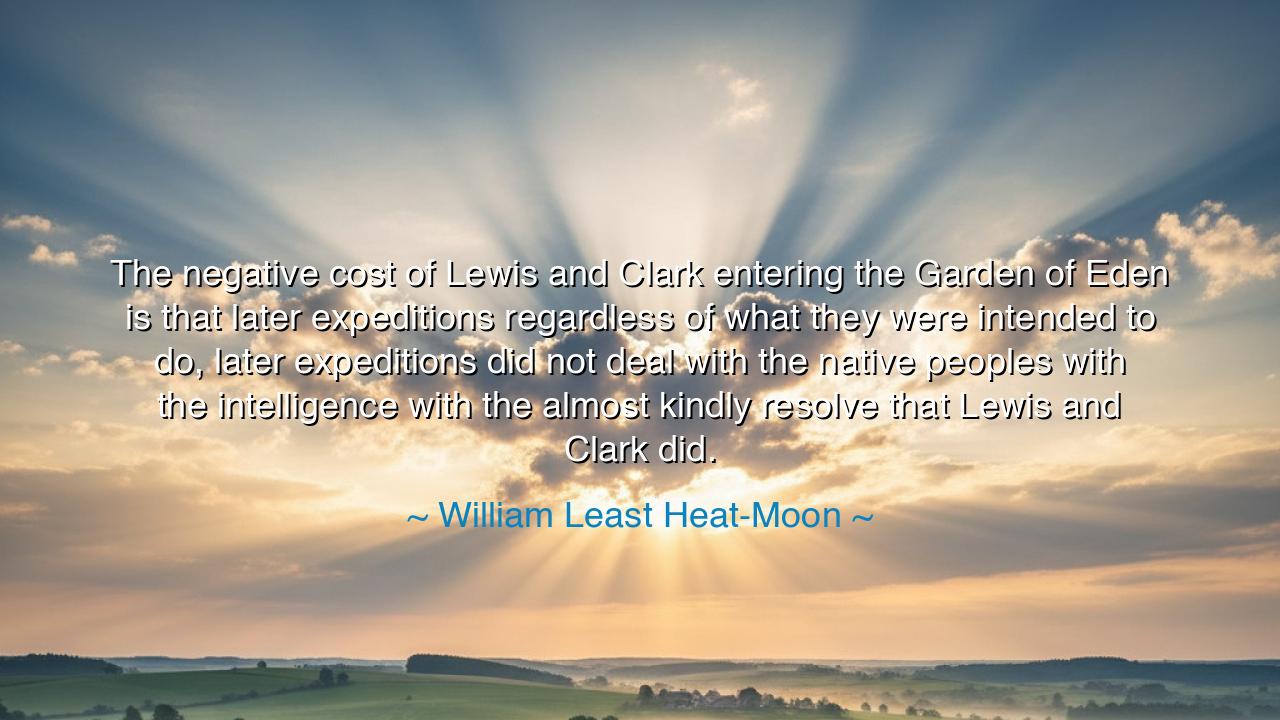
The negative cost of Lewis and Clark entering the Garden of Eden
The negative cost of Lewis and Clark entering the Garden of Eden is that later expeditions regardless of what they were intended to do, later expeditions did not deal with the native peoples with the intelligence with the almost kindly resolve that Lewis and Clark did.






When William Least Heat-Moon wrote, “The negative cost of Lewis and Clark entering the Garden of Eden is that later expeditions regardless of what they were intended to do, later expeditions did not deal with the native peoples with the intelligence with the almost kindly resolve that Lewis and Clark did,” he spoke as a man mourning the lost balance between discovery and destruction, between curiosity and conquest. His words are both an elegy and a warning — that even the noblest acts of exploration, if misunderstood by those who follow, can sow the seeds of tragedy. He invokes the image of a “Garden of Eden,” for that was what America once seemed: a vast, untouched paradise. Yet, as in the ancient tale, once the garden was entered, innocence was lost forever.
The origin of this quote lies in Heat-Moon’s deep meditation on the American spirit of exploration and its moral cost. A historian and traveler himself, he retraced many of the same routes carved by Meriwether Lewis and William Clark during their expedition across the western wilderness in the early 19th century. These two explorers, charged by President Jefferson to map the new territories of the Louisiana Purchase, were not merely surveyors of land — they were emissaries of a nation yet untested by its own ambition. They met the Native tribes with a measure of respect and intelligence, recognizing their humanity, trading fairly, and seeking peace wherever possible. Yet the footsteps that followed them brought conquest, disease, displacement, and cultural annihilation. The “negative cost” that Heat-Moon speaks of is the tragedy that enlightenment gave way to exploitation.
The metaphor of the Garden of Eden is deliberate and devastating. Just as the first humans, in their desire for knowledge, brought about their own exile, so too did America’s explorers awaken forces that would destroy the paradise they beheld. Lewis and Clark, like Adam and Eve, stepped into a world of beauty, seeking understanding. But those who came after came not to learn, but to claim, to plunder, to possess. The Eden of the New World was transformed into a field of division, its original caretakers — the Native peoples — cast out from their lands, their harmony with the earth broken by the greed of those who called themselves “civilized.” Heat-Moon’s lament is thus not merely historical; it is moral and spiritual, a reflection on how innocence once lost can never be regained.
In the ancient manner of reflection, we might compare this to the fall of Troy, whose gates were opened not by force, but by deception. The wooden horse that entered was not a gift of peace, but the herald of ruin. So too was the expedition of Lewis and Clark — a symbol of enlightenment and discovery, which became, in the hands of their successors, the harbinger of conquest. The early explorers approached the land and its people with curiosity and wonder; the later ones came with arrogance and arms. This is the eternal pattern of human folly: that what begins in reverence often ends in domination.
Consider the story of the Nez Perce, one of the tribes who aided Lewis and Clark during their journey. The explorers, weary and starving, were received with compassion and care by the Nez Perce people. Decades later, when American settlers poured into the same lands, the kindness of the tribe was repaid with betrayal. In 1877, Chief Joseph, their noble leader, led his people on a thousand-mile retreat toward Canada, fleeing persecution. When finally cornered, he surrendered with the immortal words: “I am tired; my heart is sick and sad.” The same land that once hosted a peaceful meeting of explorers and natives became a graveyard of broken promises. The kindly resolve that Heat-Moon praises in Lewis and Clark had vanished from the heart of the nation.
In truth, Heat-Moon’s quote carries a deeper wisdom than political critique. It reminds us that intelligence without compassion leads to ruin, and that exploration, if not guided by humility, becomes invasion. The “negative cost” he names is not only the suffering of the native peoples, but the moral degradation of those who inflicted it. America, in seeking to expand, lost something of its soul — the sense of wonder and respect that once animated its earliest explorers. The intelligence of Lewis and Clark was not only in their minds but in their hearts — the wisdom to see the humanity in others, even across boundaries of language and culture. That wisdom, once abandoned, left only ambition in its place.
So, my child, take heed of this teaching: every journey begins in innocence, but only those who walk with reverence can avoid the fall. When you enter new lands — whether of the earth, of knowledge, or of the soul — enter as Lewis and Clark once did: with open eyes, with intelligence and kindly resolve, seeking not to conquer but to understand. The earth is still a garden, if we would only remember how to tend it. Let your curiosity be guided by compassion; let your pursuit of truth be softened by humility. For the greatest explorers are not those who claim the most territory, but those who expand the realm of the heart. And if you must enter Eden, do so not as the taker of fruit, but as the keeper of its beauty, preserving what is sacred for those yet to come.






AAdministratorAdministrator
Welcome, honored guests. Please leave a comment, we will respond soon